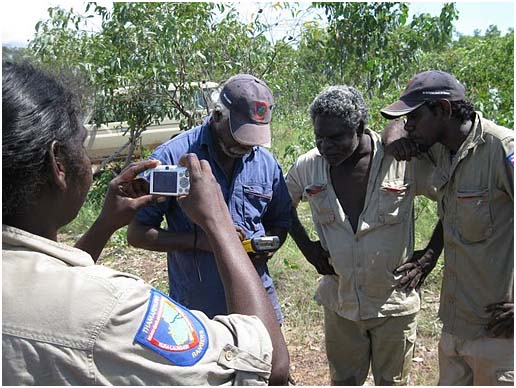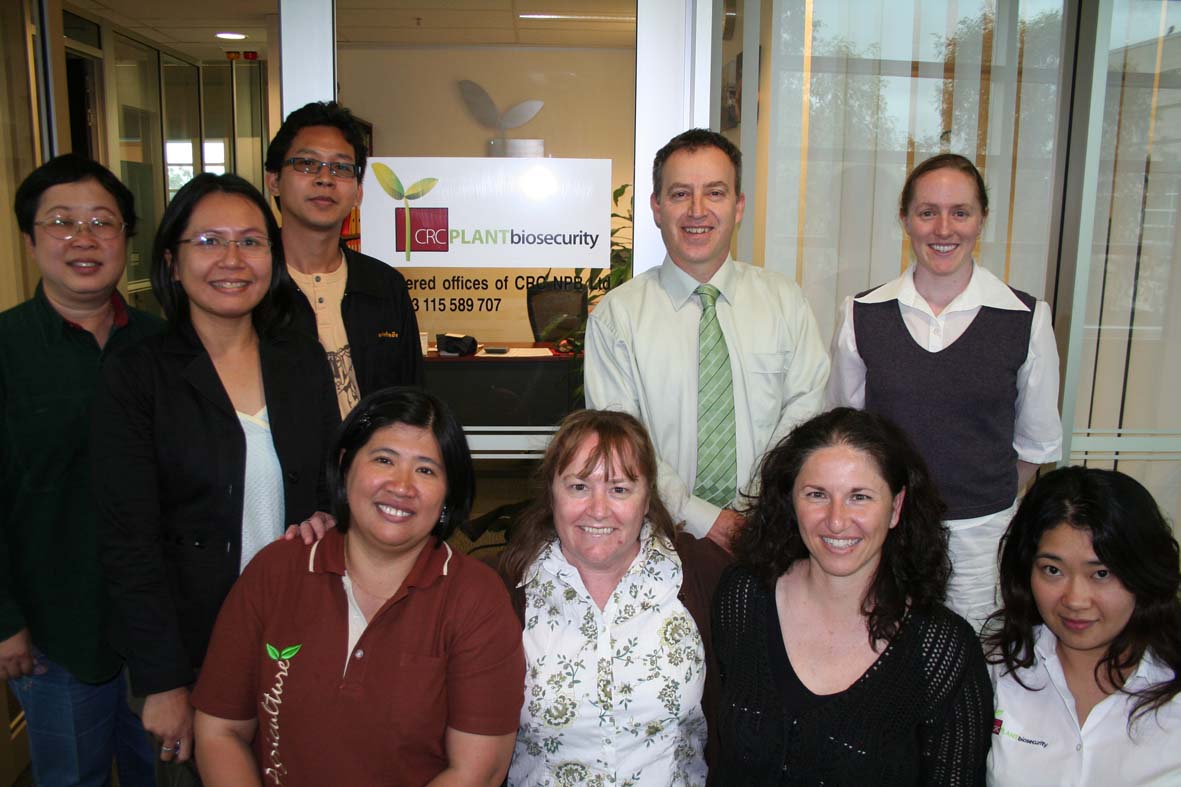training
Grain Storage and Biosecurity on-line training materials/manual
| Publication Type | Unpublished | |
| Year of Publication | 2011 | |
| Authors | weston, P.; Kent, J. |
Education and training update
In this issue I am pleased to announce that David Savage and Bonnie Vogelzang have submitted their PhD theses. Further, Ashley Zamek has completed her Honours thesis.
Mobile technologies assist plant biosecurity management
 In northern Australia and Indonesia, developing rob
In northern Australia and Indonesia, developing rob
Events
See below for industry related events. If you would like to add an event to this page, email info@crcplantbiosecurity.com.au
Under the WTO there is increasing pressure on countries to comply with agreed sanitary and phytosanitary standards (SPS) to satisfy trading partners and to access markets. Such SPS conditions apply equally to developed and developing countries, however the latter often lack the expertise, infrastructure and organisational processes required to meet such standards. Together, these elements form the Plant Health System of a country and serve both its trading activities and crop protection needs.
Plant pest diagnostics is at the heart of any Plant Health System and countries that do not have the ability to identify its pests cannot satisfy the requisite SPS conditions for trade. Nor can they protect against the incursions of pests or manage the pests that damage crops. The lack of a Plant Health System is then a huge impediment to economic growth for developing countries.
Research outcomes:
We designed training activities and implemented a workshop program to improve the capability and capacity of plant pest diagnostics in Thailand. The program focussed on current technologies to provide Thailand with fundamental systems and processes that will provide greater efficiencies in diagnostics and which can be expanded across the Thai Plant Health system. The program focussed on providing molecular identification, traditional taxonomy, digital knowledge systems and remote microscopy which led to the following outcomes.
- A Molecular diagnostic laboratory was established in Thailand and staff were embedded in Australian laboratories to learn up-to-date molecular techniques and work practices. The high level of skill attained by Thai scientists was demonstrated in their ability to routinely perform molecular techniques in their own lab, to train their own staff in molecular techniques and to develop diagnostic protocols and optimise existing tests for their own purposes. The focus of this training was on trade sensitive pest groups, such as citrus canker, Huanglongbing, viruses, nematodes, fruitfly and seed-borne bacterial pathogens, to give a good grounding in molecular identification.
- The discovery of new fungal pathogens and the documentation of known pests during the course of this project indicates that staff were able to apply taxonomic principles as well as molecular techniques to verify pest identification. Digital technologies such as advanced image capture techniques and web-based information systems were introduced to Thai scientists so that they could document their diagnostic information and share it over the internet to provide a valuable source of diagnostic information. The Thailand Biosecurity website was established for this purpose.
- Image capture hardware and software were provided together with intensive training and user guides so that high quality images of pests could be obtained for the website. A special laboratory was established by Plant Quarantine for this equipment and for training staff in image capture techniques and use of the website.
- Microscope hardware for remote diagnostics was installed in Bangkok, Chiang Saen, a quarantine port on the northern border with Laos and Myanmar, and at Laem Chiang, the major sea port. A dedicated lab was established in Bangkok for the equipment and remote microscope (RM) operations, as well as for training staff. Post Quarantine (PQ) has plans to establish nine more RM at key border ports to manage the identification of pest interceptions. These systems will be installed according to our specifications.
- An additional use of the RM equipment is that it can be used to remotely train staff in pest identification. RM interactions with experts in Australia were conducted during the course of the project for this purpose.
Research implications:
The current project has provided both skills and lab infrastructure that improve the ability of Thai Post Quarantine PQ to identify and respond to pest threats more efficiently. There is strong support for these new developments from the Thai PQ managers (because of trade implications) and a good prospect that they will continue to develop their expertise and lab infrastructure into the future.
Acknowledgements:
This project was co-ordinated by the Cooperative Research Centre for National Plant Biosecurity in collaboration with its partners, including the CSIRO, Department of Primary Industries and Fisheries Queensland, the Department of Primary Industries Victoria and the NSW Department of Primary Industries.
Thanks also to Dr Ken Walker of the Museum of Victoria who supported training for Thai scientists as well as the development of the Thailand Biosecurity website.
PROJECT LEADER
Dr Gary Kong
Project Leader CRC20093: Increasing diagnostic capacity in Thailand
Gary.Kong@deedi.qld.gov.au
Read More
PROJECT DETAILS
Complete
Term
January 2008 - November 2010
Budget
$579,436 (cash and in-kind)
PROGRAM DETAILS
LOCATION
CORE CRC PARTICIPANTS
Outcome
Education and training: Increased awareness, knowledge and skills levels of industry personnel, and supply of trained scientists.
Goal
The awareness, knowledge and skill of industry personnel, and supply of trained scientists involved in the supply chain and import/export pathways will be enhanced through education and training.
Indicators of success
Capacity:
New postgraduate scientists are supplied to the plant biosecurity community.
Short courses and workshops are delivered to plant biosecurity research staff and students and industry professionals.
Establishment of new university courses in plant biosecurity.
Education And Training Research Projects
| Title | Leader |
| CRC60047 - T: A National Postgraduate Curriculum for Plant Biosecurity | Dr Anthony Clarke |
The traditional research disciplines underpinning plant biosecurity are the plant protection fields of entomology and plant pathology. However, plant biosecurity is more than just pathology and more | |
| CRC60125: Grain Storage and Biosecurity Training | |
Stored grain is subject to major biosecurity problems which have the potential to significantly reduce the quality of the stored grain and to make it unsuitable for both domestic and international more | |
PROGRAM LEADER

Dr Kirsty Bayliss
Program Leader Education and Training
Email: k.bayliss@crcplantbiosecurity.com.au
Phone: 08 9360 2814
Fax: 08 9360 6303
Read More
STRATEGIC OBJECTIVE
To undertake training of Honours and PhD candidates in plant biosecurity, to provide workshops and courses for people working in industry and the government sector, and to provide opportunities for research staff and students to enhance skills, develop industry awareness, and ensure that Australia has the highest quality plant biosecurity research community.

_D0228-low-res.jpg) Complementing the June appointment of Dr Yong Lin Ren as
Complementing the June appointment of Dr Yong Lin Ren as Due to the increased movement of people and agricultural
Due to the increased movement of people and agricultural 


